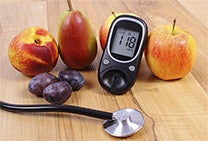
Diabetes is something nobody wants to have. However, there is good treatment for diabetes if you actively manage it. The best way to fight diabetes or pre-diabetes is to be educated on the subject. Our resident dietician Teresa Anderson, CDE teaches regular classes on diabetes self-management. We spoke with her about her classes and learned a thing or two about what she teaches.
Why should someone attend your diabetes classes?
Because you don’t know what you don’t know about diabetes, and what you do know might be wrong. People come to me with misinformation all the time and we clear things up. You come to class to learn, or re-learn, things you may have ignored before or maybe didn’t need to know earlier. Diabetes and your body both change over time. What we know about diabetes and how we treat diabetes changes, too.
.
Diabetes is largely a self-managed disease. You need skills and a plan on how to make changes. I cover disease management, medications, risk-reduction, problem-solving, how to live with diabetes, nutrition interventions, basic fitness plans, methods of monitoring and explain standards of care.
What do you teach those who have pre-diabetes?
In the pre-diabetes stage [there is no ‘border-line’ diabetes], our goal is to arrest it and put it into submission. We aim to halt it in the pre-diabetes stage and prevent it from becoming type 2 diabetes as long as we can. If we do this, the patient can really reduce lifetime risks. The curriculum is similar: disease management, risk-reduction, problem-solving, quality of life, nutrition interventions, basic fitness plans and methods of monitoring,
We learn to look for signs of your diabetes changing: increased thirst and urination, sleepiness, pain or numbness in hands or feet and blurred vision, for example. Of course, these symptoms can be caused by other maladies, but if you are aware they can be a sign of higher blood sugars you will want to get checked to see if your diabetes is changing.
What kinds of things do attendees learn in your nutrition classes?
I advise starting with Meal Planning 101. Meal planning is not just what you eat; when and how much also affect not just your blood sugars but your weight and metabolism. “I know what I should do” is something I hear regularly; eventually attendees usually admit they really didn’t. They can start with that layer of dietary changes. Then, when they have their consultation with me, I can provide an individualized nutrition plan or meal program. It’s like having a personal trainer with food.
I also offer nutrition classes that focus on heart health, label reading, shopping, cooking and recipe adjustment.
Do you actually get to see people’s lives change?
Oh yes! People come to me looking healthier, thinner, more engaged. Yesterday I told someone that her mood is improved and it is good to see her smile. She lost 7.5 pounds since her last visit. I have people who are training for half marathons and day-long challenge excursions. Their confidence grows as they learn and improve their lifestyles. The great thing is that there are no side effects to improving your lifestyle – there are no side effects to eating better and losing weight when done correctly!
Any other reasons those at risk of diabetes or who have diabetes should take your class?
Diabetes self-management education supports people reaching improved clinical outcomes, quality of life and lower health care costs. Life cost of treating diabetes averages around $85,000 for a lifetimes.
The DMCC is a Nationally Accredited program by the American Association of Diabetes Educators [AADE]. We offer comprehensive Diabetes Self-Management & Education & Support [DMSE/S]. DSME is skills-based and patient-centered to respond to individuals’ preferences, needs, and values. DSME improves patients’ knowledge and self-care behavior. This improves clinical outcomes, improved reported quality of life, lower body weight, healthier coping, and lower health care costs. To find out more or to sign up for an upcoming class click on this link




